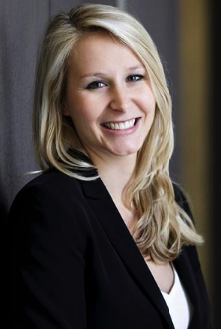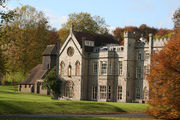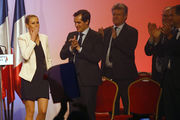Catherine Willoughby
| The Right Honourable Catherine Willoughby MP | |
|---|---|

| |
| Prime Minister of Kiribati-Tarawa | |
| Incumbent | |
| Assumed office 19 January 2014 | |
| Monarch | Victor Emmanuel I |
| Deputy | Thomas Attenborough (2014-2017) |
| Preceded by | Thomas Attenborough |
| Leader of the Conservative Party | |
| Incumbent | |
| Assumed office 19 January 2014 | |
| Preceded by | Thomas Attenborough |
| Member of Parliament for Conningridge | |
| Incumbent | |
| Assumed office 22 July 2010 | |
| Preceded by | Arthur Langley |
| Majority | 27,819 (37.8%) |
| Personal Private Secretary to the Prime Minister | |
| In office 29 December 2008 – 4 July 2010 | |
| Prime Minister | Arthur Langley |
| Preceded by | George Landon |
| Succeeded by | Elizabeth Wakeham |
| Personal details | |
| Born | Catherine Evelyn Willoughby 12 March 1986 Westminster, Kiribati |
| Political party | Conservative |
| Spouse(s) | Mark Washburn (m. 2013) |
| Parents | Edward Willoughby Mary Willoughby |
| Residence | 10 Downing Street |
| Alma mater | Trinity College, Westminster |
| Religion | Church of Tarawa |
| Signature | |
Catherine Evelyn Willoughby (born 21 June 1983) is the Prime Minister of Kiribati-Tarawa and Leader of the Conservative Party. She represents Conningridge as it's Member of Parliament (MP).
Part of a series of four Tory Prime Ministers, Catherine Willoughby made her political debut in 2009 as the Privy Secretary (a Chief-of-Staff position) in the cabinet of Prime Minister Arthur Langley, abandoning her career in finance to pursue politics. She held the position for a total of three years, under Langley and his successor, Thomas Attenborough. In 2014, she challenged Attenborough for the Conservative Party leadership and won in the 2014 Conservative Party leadership election, thus becoming Leader of the Conservative Party and Prime Minister.
As Prime Minister, she has pursued an avowedly right-wing economic policy, with a more lenient stance on social issues. Free-market reforms, low taxes, military expansion, and family values form the core of her political beliefs. She is also the first and only female Prime Minister in Kiribati's history to date.
Willoughby's premiership has seen the rollback of the welfare state, specifically in terms of civil service reductions and austerity. Her Government's primary goal has been to reduce the national debt, while at the same time decreasing taxation of all classes of society. Her Government first introduced the flat tax rate, now one of the central components of her party's platform.
Contents
Early life
Catherine Evelyn Willoughby was born in 1983 in Westminster, the capital of Kiribati. Her parents, Reginald and Evelyn Willoughby, were relatively affluent; her father was an investment banker at Polaris Partners, managing one of the largest hedge funds in Kiribati. Reginald Willoughby maintained strong connections with the Conservative Party and has donated the legal maximum private contribution to the party annually for more than thirty years. Her paternal grandfather was Sir Lionel Willoughby, a barrister and appellate judge.
Education
From the age of five, Willoughby was educated at the Westminster Academy, Kiribati's premier girls' primary school. At the age of thirteen, she was admitted to Westland Abbey Girls' School, one of the best preparatory schools in the nation. At Westland, she took on leadership roles in numerous student organisations and demonstrated an early interest in politics. Through her peers, she established connections with numerous wealthy or politically-connected families.After graduating from Westland, Willoughby was admitted to Trinity College, Westminster, where she studied philosophy, politics, and economics. She was an active member of the Debating Union at Westminster and was the first woman to be elected President of the Union in her third year. She graduated from Westminster with a first-class degree and made the Chancellor's Honours list, a distinction awarded only to top scholars.
Early political career
Royal Bank of Tarawa
After graduating from Westminster in 2008, Willoughby was quickly recruited by the Royal Bank of Tarawa, one of Kiribati's biggest investment and lending banks. Given her background in PPE, Willoughby was made a political liaison, in charge of working with Members of Parliament and the Government to see the enactment of legislation to benefit the RBT's operations.
During this time, she became acquainted with several prominent politicians, including the Prime Minister, Arthur Langley, himself. Speaking of her early career, Willoughby insists, "I was never particularly interested in finance or banking, it was just a way to pay the bills. I'd always envisioned myself in politics, and this just happened to give me the opportunity to pursue my passion."
Downing Street staff
Willoughby first met Langley at a reception for alumni of Trinity College, Westminster. During the meeting, she discussed her political ambitions with the then-Prime Minister, who was reportedly impressed and offered her a job with his staff at Downing Street.
Member of Parliament
Conningridge by-election
In 2010, Arthur Langley, also the Member of Parliament of Conningridge, resigned from both offices, prompting a by-election in the Conningridge constituency, a safe Conservative seat. Willoughby was selected by the local Conservative association to contest the seat. With Langley's endorsement, as well as due to the fact that the seat is solidly Conservative, Willoughby won her election handily, defeating her Labour challenger with 37.8% of the vote. She assumed her seat on 22 July 2010 and accepted the Conservative whip.Due to the Government's already-slim majority and speculation of an upcoming election later in the year, the election was closely watched, and thrust Willoughby into the national spotlight at the very beginning of her parliamentary career.
Back benches
From the back benches, Willoughby proved herself to be a strong debater and Parliamentarian, dedicated to breaking what she later described as the "consensus of defeat." She came out strongly against welfare and social service expansion, open-borders immigration, and expansive state spending, and was regularly critical of the patronage culture of Parliament and the Westminster bureaucracy of the Civil Service. She advocated for a strong military ready to intervene where necessary, an end to decolonisation, and a dramatic overhaul of welfare, social services, taxation, and the economy. Unafraid to speak - and vote - her mind, she was described as, "a whip's worst nightmare," by Thomas Woolworth, the Deputy Prime Minister at the time.
Willoughby's vocal debating style won her support from the right wing of the Conservative Party, which had felt alienated by the succession of centrist Tory leaders, namely Torre, Langley, and Attenborough, and had been longing for a leader to get behind. Many of the members of the right wing, however, were either too old or lacked the political capital and accumen to attempt the lead the Party, and so looked for a younger MP to lead them to victory. They began to rally around Willoughby and made her their de facto leader of the self-styled Park Street Group (so named for the street in whose restaurants they often met to discuss business). Under Willoughby's leadership, the Park Street Group introduced two private member's bills - one to enact stricter border controls and another to reform infrastructure grant allocations - which were both ultimately defeated, despite strong support from a majority of the Conservative Party.
Prime Minister
Conservative Party leadership
In 2013, a series of consecutive by-election defeats reduced the Government's already slim majority to one seat, forcing Attenborough to negotiate a confidence agreement with the Coalition for Compromise, a centrist party controlling 29 seats in Parliament, in order to maintain a working majority. The incident was the first time that a Prime Minister had lost a working majority as a result of by-elections. Willoughby, by now the de facto leader of the right wing of the Conservatives, seized on the debacle, accusing the Prime Minister of having, "more in common with the centrists than with his own Party."At the 2013 Conservative Party Conference, held at Oldcastle, Willoughby delivered a stirring speech that was also a scathing criticism of Attenborough and his Government. In it, she said, "If one wants to win an election, one has to stand for something, because people will not vote for nothing. We as a Party must decide what we stand for and then stand tall with our feet firmly on the ground. It is no time to go wobbly." Willoughby particularly shined in comparison to the Prime Minister, whose speech the following day was largely seen as dull and too policy-oriented.
When Parliament recessed for Christmas and the New Year, Willoughby began building up support for a leadership challenge to Attenborough. She began meeting individually with sympathetic Conservative MPs, including several members of the cabinet. In particular, she developed a close working relationship with her ideological companion, Anthony Bainbridge, the outspoken Foreign Secretary who shared her concerns about Attenborough's viability as party leader. On 2 January, Bainbridge became the first member of the cabinet to oppose Attenborough's leadership. He resigned from the cabinet in protest and formally challenged the Prime Minister for the party leadership. Bainbridge was defeated, but denied Attenborough the two-thirds majority required to prevent a second ballot.
Per the bylaws of the Conservative Party, a second ballot was held on 10 January and made open to all members of the parliamentary party. Bainbridge withdrew from the leadership race and instead nominated Willoughby for the leadership. Five candidates initially stood for the leadership, including Willoughby and Attenborough. After the fifth round of voting on 18 January, Willoughby was declared the winner and was invited to form a government.
First ministry
Despite successfully unseating Thomas Attenborough and taking control of the party, Willoughby inherited a cabinet largely full of Attenborough's loyalists from the moderate wing of the party. To shore up support within the cabinet, she appointed Attenborough as her Deputy, but did not give him a ministerial portfolio, keeping him on as a formal adviser. She faced strong pushback from her own cabinet in trying to implement her more radical reforms. Additionally, the Conservatives' one-seat working majority meant all policies pushed by the Government had to be approved by consensus of both the cabinet and the backbench committee.
Cabinet crisis of 2017
By late 2016, Willoughby's relationship with her cabinet had deteriorated markedly; with few allies in her own Government and a razor-thin one-seat majority in the House of Commons, the prime minister was forced by her cabinet secretaries to moderate her positions, as any resignations would have resulted in the collapse of her premiership. Tensions in the cabinet finally reached a head in January 2017 over the issue of abolishing the secondary income tax; the policy was supported by Willoughby's allies in the more conservative wing of the party, but opposed by moderate cabinet ministeres, including the then-Chancellor of the Exchequer, Daniel Taylor. Despite the Chancellor's opposition, Willoughby persisted and refused to endorse any budget that did not include the policy, prompting Taylor and ten others in the cabinet to offer their resigations.
Second ministry
The "Night of the Long Knives"
Following the Conservatives' unexpected gains in the 2017 general election, Willoughby was appointed for a second term as prime minister. With an increased majority and newfound electoral legitimacy, Willoughby no longer had to rely on the Coalition for support in Parliament; meanwhile, the hardline conservatives within the party were emboldened by Willoughby's reelection and the Attenboroughites found little support among the backbenchers. In forming her second cabinet, Willoughby dismissed nearly all of her former ministers in favour of more right-wing candidates. Only two ministers from her first cabinet were reappointed.
The press referred to her restructuring of the cabinet as the "Night of the Long Knives," in reference to Adolf Hitler's infamous purge, a label which Willoughby rejected. The details of Willoughby's cabinet appointments were not made public until the opening of Parliament, with some ministers reportedly not knowing they had been dismissed until the official public announcements in the speech.
The same day, Willoughby's new cabinet collectively announced a restructuring of the civil service, designed to reduce bureaucratic overhead and increase accountability. Over 7,000 career civil servants across 15 different departments were dismissed without replacement, including a number of permanent secretaries and undersecretaries. In total, 13 cabinet ministers and more than 7,000 civil servants were dismissed from government service in a single day.
Political positions
Privatisation
Willoughby is opposed to any state ownership of industry and her Government has overseen the sale of ƒ39,000,000,000 worth of stocks to private investors across several state-owned sectors, including the complete privatisation of Royal Mail and the defence contractor Tarawan Aerospace.
Tarawan devolution
Willoughby has endorsed the "one nation, one people, one Parliament," position formally adopted by the Conservatives, and opposes the creation of a devolved Tarawan parliament, arguing that it would lead to increased political separation between the two nations and eventually to independence. She has also personally questioned the motives of Angus McClellan, leader of the Tarawan National Party and de facto head of the independence movement, calling him a, "self-obsessed nutter, hell-bent on constitutional armageddon." Her Government has refused to endorse any legislation that would give increased power to local Tarawan authorities.
Personal life
Willoughby is married to Mark Washburn, an architect and adjunct lecturer at the Imperial Polytechnic University in Westminster. The two met at university during their undergraduate study and began dating after graduation. They were married in 2013 while Willoughby was a Member of Parliament in the Chapel of St. Jerome in the Palace of Westminster.
Since his wife's ascension to the premiership, Washburn has kept a relatively low profile, rarely appearing alongside Willoughby in public. Willoughby and her husband have no children as of now, but speaking on the matter, Willoughby has said, "We've thought about it, we haven't ruled it out. We'll see what happens."



